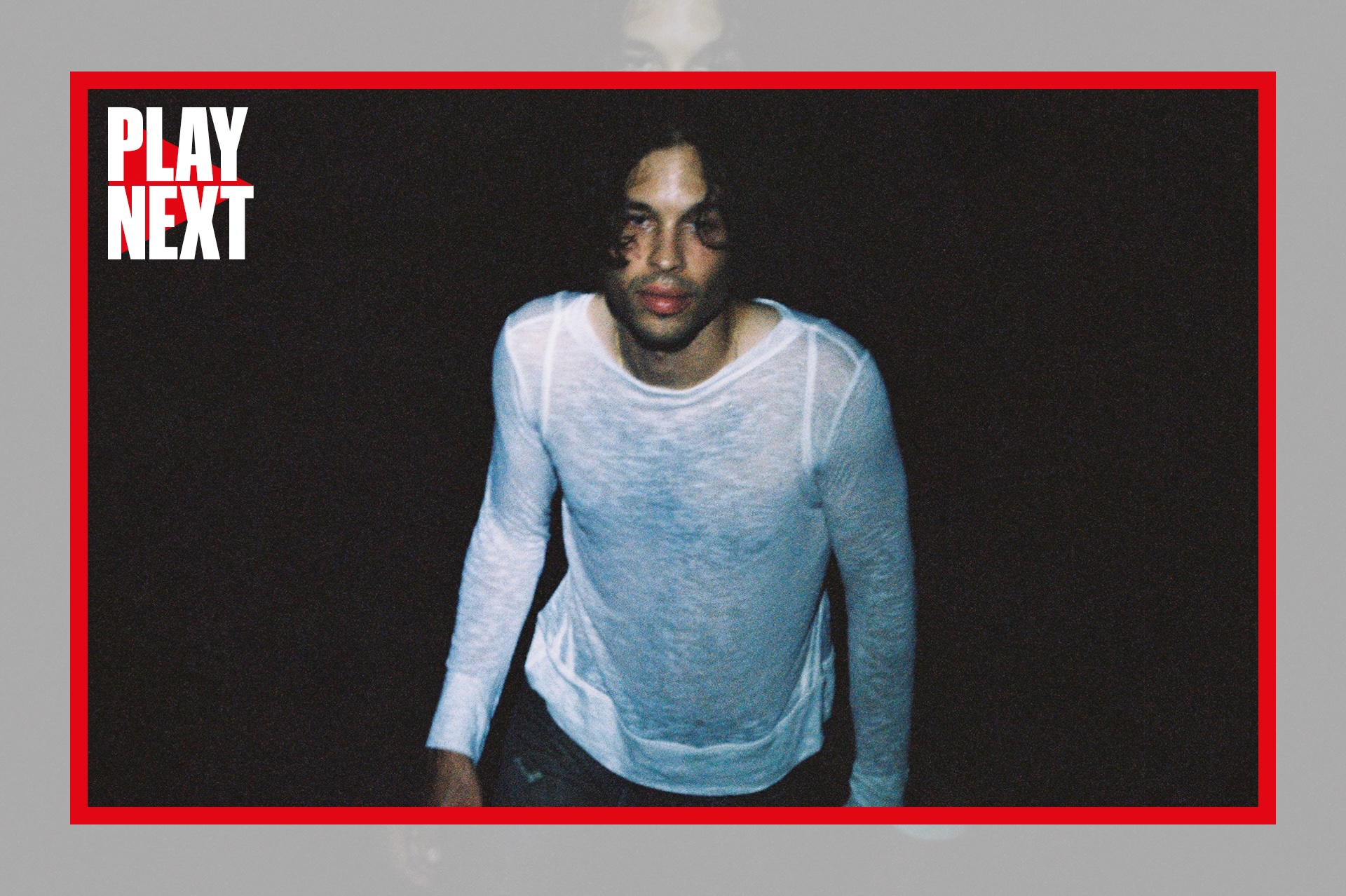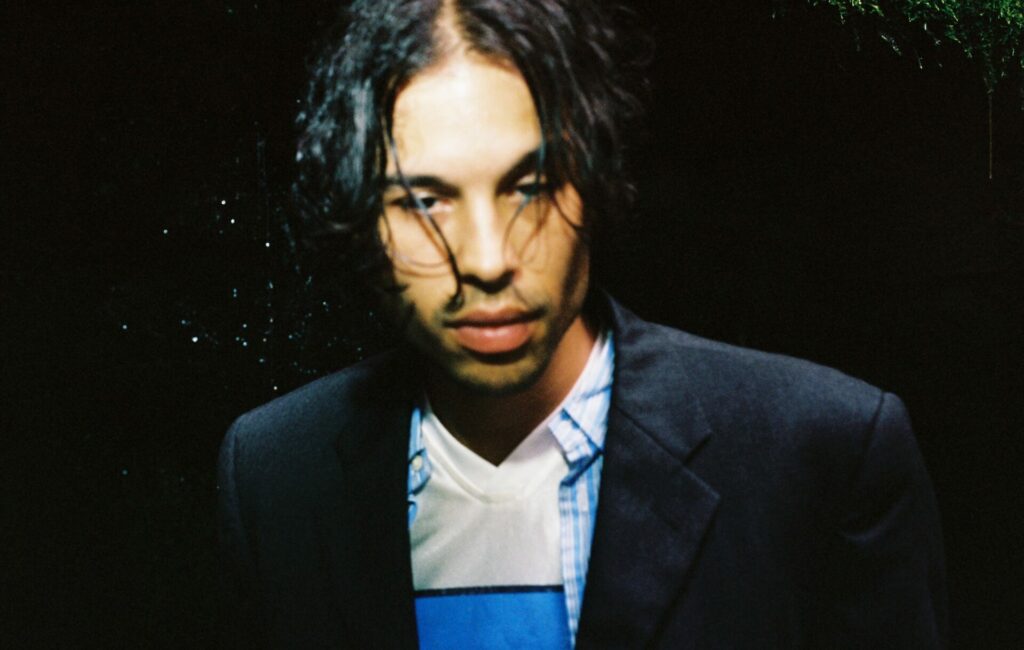Meet Body Meat, the brilliantly restless musical polymath
Chris Taylor’s debut album ‘Starchris’, eight years in the making, is a dazzling masterpiece of deconstructed pop music.

Starchris, the debut album from Body Meat, is a kaleidoscopic journey through pop, rap, Afrobeat, metal and beyond. It’s the most fully formed and realised presentation of the incredible mind of Chris Taylor, who launched the project in 2016.
On the album – a 55-minute journey that barely ever stands still – Taylor pieces together ideas from across the genre spectrum (‘High Beams’ turns from a hip-hop rager into a full-on metal breakdown, while ‘Focus’ is a glitchy and bright dance gem) with no parameters at all.
“The point of Body Meat is that I wanted to be able to make anything at any time, and change anything at any time,” Taylor tells Rolling Stone UK from his upstate New York home.” In the eight years since its inception, the project has sonically dipped into his Ethiopian heritage (his father played congas with Earth, Wind & Fire), cutting-edge hip-hop, guitar-based tracks and beyond, all written and produced with a brilliantly restless nature.
“I just want to make the most intense and fun thing for me to listen to, regardless of genre or anything like that,” Taylor says. “I will take it part-by-part, and wherever it ends up is where it ends up.”
Of the ethos behind Body Meat, he adds: “I wanted to have something that was wholly mine, that I could change the sound of whenever I felt like it. The whole ethos is that there’s no limit to it. I know there’s things that like people like that I do, and I definitely respect that, but they also are coming into it with the understanding that it could be gone or change at any moment.”
Watch Body Meat’s video for the single ‘Electrische’ and read our Play Next interview below.
You’ve released a lot of music as Body Meat – is the categorisation of Starchris as your debut album still important, and does this really feel like your first full statement?
It does make sense to call it that. I’ve never really presented anything that I’ve done as a full album. Everything else I put out has been just because I just wanted to. This was written with the intentionality of it being an album.
You’ve said that ‘Crystalize’ was the song that started the album in earnest – what was it about that song that started things off?
That song took me about a year and a half to make, and then the mixing of it was really, really insane. There are about 40 different mixes – it’s pretty wild looking at the folder of all of them! I was still writing it while I was mixing it with my friends, so I would go in and mix a part of the song, and then I would get on the train to go back home and literally just throw a whole part away and write a different section. Once that solidified, that was how I knew what the record should sound like. I injected that sound into the other stuff.
As a listener, it feels almost impossible to work out how a Body Meat song is made from the ground up – is it a case of just trying things and seeing what works?
I’m trying different things every time. I really love music that has as a character to it. Each song will literally have a main character. Each track that I make, I’ll think, ‘Okay, what’s the character of this track?’ That’s probably the only guideline I really ever use. Everything else is going part-to-part. I just want to make the most intense and fun thing for me to listen to, regardless of genre or anything like that. I will take it part-by-part, and wherever it ends up is where it ends up.
Is this idea of characters also related to video games becoming the core idea behind the project? You’ve even released a video game for the single ‘North Side’…
I’ve always been into game design and interested in video games and game development. ‘North Side’ is about a fantastical world, and I thought I could just teach myself this programming language and how to design a game. Maybe it won’t be that good, but I think people that listen to me are pretty forgiving. Ithonestly turned out way better than I thought, and I see video games and game design and being a game developer as a core part of who I am now. That’s something I’m really grateful to have found in this whole process.
‘North Side’ is about a shopkeeper who’s returning to the forest and a great orb is trying to engulf everything, and he has to save it. I love RPGs and the cryptic games where you have to read between the lines of dialogue, and there’s secrets. There’s still a secret in the game that I think only one of my friends has found.
Have you always been drawn to the fantastical in your lyrics?
I try to keep them really hard to decipher, because they’re so personal to me. I make it more of a riddle than most people do, but a lot of it is really, really personal. I try to keep it vague but still have the intense meaning that I’m feeling at the time.
It’s funny, lyrics are such a secondary thing [in Body Meat], because I put so much of myself into the the music of it all that the lyrics are literally there just to add a sprinkling to what’s going on. There are some songs where I’m, really, really singing and really going for it, but it’s because I thought that was the sprinkling that song needed.

The lyrics are also obscured by your heavily processed vocals, one of the album’s most distinctive characteristics – why did that style appeal to you? On ‘Focus’ in particular, it feels like so many versions of you are overlapping on each other.
I don’t want something to come off as too obvious or earnest. I guess it’s being embarrassed a little bit about how you’re feeling, like everyone is when they’re creating something. It is a little bit of masking it, but it also just helps it sit in a palette. I do keep my voice pretty dry compared to a lot of other artists that really like. In the past, people have told me, ‘I can’t hear your words!’ and so I’ve became self-conscious about [that]. I don’t want to feel like I’m hiding.
My voice is such a delicate thing for me, that I feel like it’s ever-changing. It needs to be lifted by the music. That’s why I love using the Auto-Tune and I love twisting it up and pitching it. You can do a lot with it. I really do want to make a whole album where I don’t sing though. I want to make a body of work where there’s no words at all.
Do you see Starchris as the beginning of the next phase of Body Meat, and has this process changed what you believe the project can be moving forwards?
Absolutely. I have such a big vision for the next thing and it will be pretty different. There’s a bit of it where I’m going to remove the computer aspect and be using electronic gear not from computers. I just want to break it up a lot more. This is just a little snippet.
